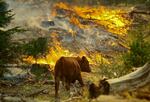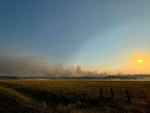This summer’s historic wildfires in Oregon have taken a toll on ranchers and their more than a million cows and other livestock, prompting a unified plea by the state’s top leaders for federal help.

Ranchers in Oregon have scrambled to get their cattle out of harm’s way this summer.
Courtesy of Juliet Connant / Oregon Capital Chronicle
Gov. Tina Kotek declared a state of emergency and invoked the Emergency Conflagration Act eight times to deploy state resources to help ranchers and local communities. And then at the end of July and again in early August she called on the U.S. government for help.
She asked the U.S. Department of Agriculture to designate 23 counties in Central, Southern and Eastern Oregon disaster areas and open up federal resources to help devastated communities, a plea that was backed by all eight members of Oregon’s congressional delegation, Democrats and Republicans.
“As climate chaos continues to worsen — turning fire seasons into fire years that see millions of acres scorched and countless lives forever changed – we must make sure communities can access the federal resources they need to equitably recover from these increasingly devastating fires,” the lawmakers wrote.
The delegation and Kotek asked Agriculture Secretary Tom Vilsack to work with the U.S. Forest Service, which falls under the USDA, to modify grazing permits. She and Oregon Sens. Jeff Merkley and Ron Wyden made the same request to the U.S. Department of the Interior, which oversees the Bureau of Land Management. The BLM manages more than 245 million acres nationwide, including 16 million in Oregon and Washington.
Oregon ranchers, who own more than 1.2 million heads of cattle and sheep, depend on that land to feed their livestock in the summer. But they submit their grazing plans in the winter, months before they know where the fires will burn. And this year the blazes were historic: A total of 1,650 fires have scorched over 1.5 million acres in Oregon, setting a new record. Much of the land blackened was grazing allotments, said Matt McElligott, president of the Oregon Cattlemen’s Association.
When fires emerge, ranchers have to snap into action to get their cattle out of harm’s way, McElligott said. He has cows grazing this summer and at one point, a fire flared just south of his forest allotment and threatened about 550 of his cattle.
“We didn’t know if it was going to blow up on us,” he said.
McElligott helped put it out. He also carved bulldozer lines around properties threatened by the Monkey Creek Fire in Umatilla County.
The threat was real, McElligott said.
“The weather was hot. The winds were blowing, and it was moving fast,” McElligott said. “There were thousands of people on that fire.”
The Monkey Creek Fire merged with others to form the Battle Mountain Complex of fires that are still not fully contained. They’ve blackened more than 183,000 acres, destroyed seven homes and 10 other buildings and forced ranchers to scramble to protect their cattle and property.

A wildfire outside Ukiah in Umatilla County becomes part of the Battle Mountain Complex of fires that have burned more than 183,000 acres and destroyed seven homes and 10 other structures.
Courtesy of Northwest Interagency Coordination Center
If McElligott had followed his grazing permit, he would have moved his cattle on land that was on fire. So he worked out an agreement with the local BLM official under an “adaptive management” clause to move them elsewhere. But not all federal officials are flexible, he said.
“It’s like anything else, you get in the habit of doing things one way and you think that’s just the way it should be,” McElligott said.
That’s why McElligott and others asked Kotek to intervene. He said federal cooperation and resources are crucial to helping families get back on their feet. McElligott has not lost any cows. Others have, and he said it’s going to take a while to assess the damage.
“Everybody’s been busy either fighting fires or trying to find their cattle and take inventory,” McElligott said.
He suspects by October ranchers will have a tally of their losses. Though firefighters have made progress on many of the wildfires, new ones have flared, prompting Kotek to invoke the Conflagration Act five more times since the end of July.
Ranchers say federal help can’t come soon enough, a sentiment that lawmakers echoed in their letter to Vilsack.
“Given the harm these fires have caused to both the physical and social infrastructure throughout Oregon, we urge you and your department to ensure the state, local and tribal governments have all the resources they need to help Oregonians recover from these deadly fires,” the lawmakers said.
Oregon Capital Chronicle is part of States Newsroom, a network of news bureaus supported by grants and a coalition of donors as a 501(c)(3) public charity. Oregon Capital Chronicle maintains editorial independence. Contact Editor Lynne Terry for questions: info@oregoncapitalchronicle.com . Follow Oregon Capital Chronicle on Facebook and X.